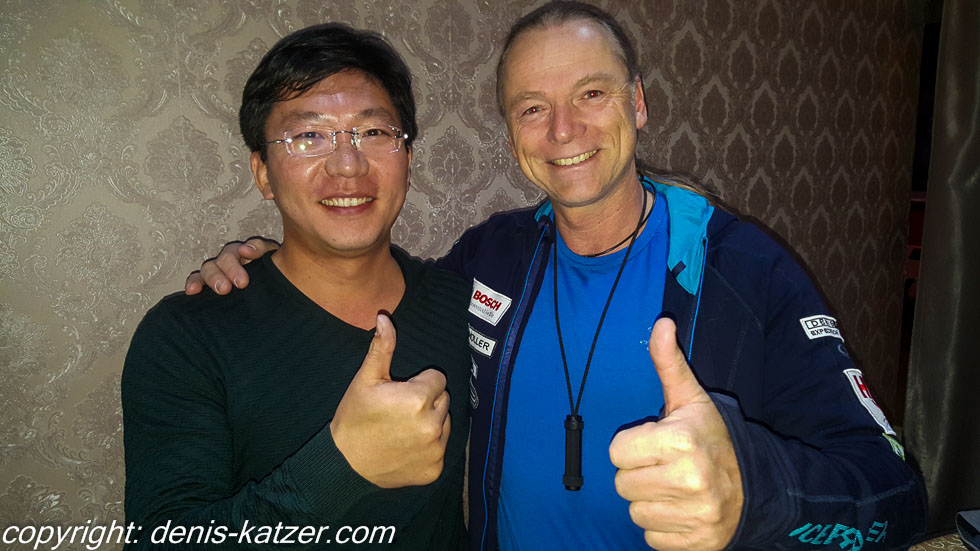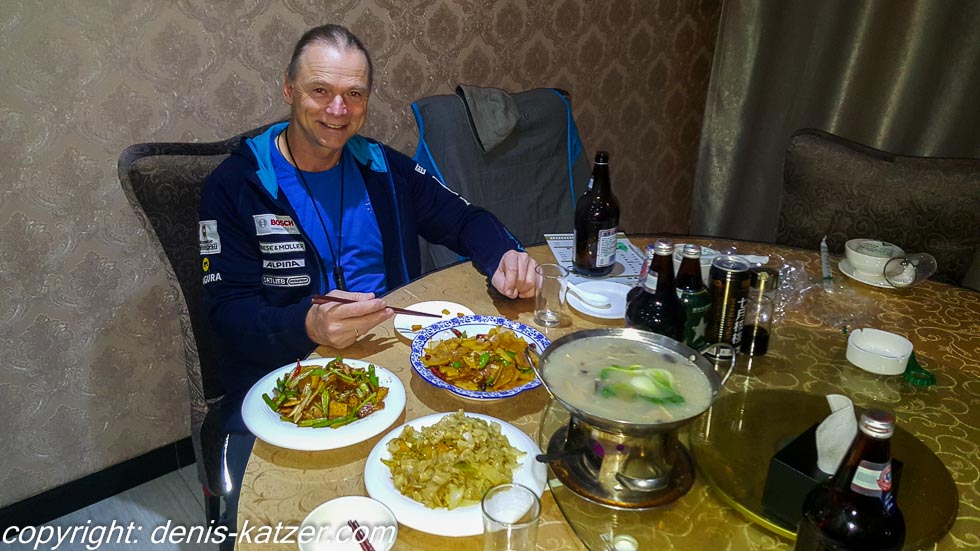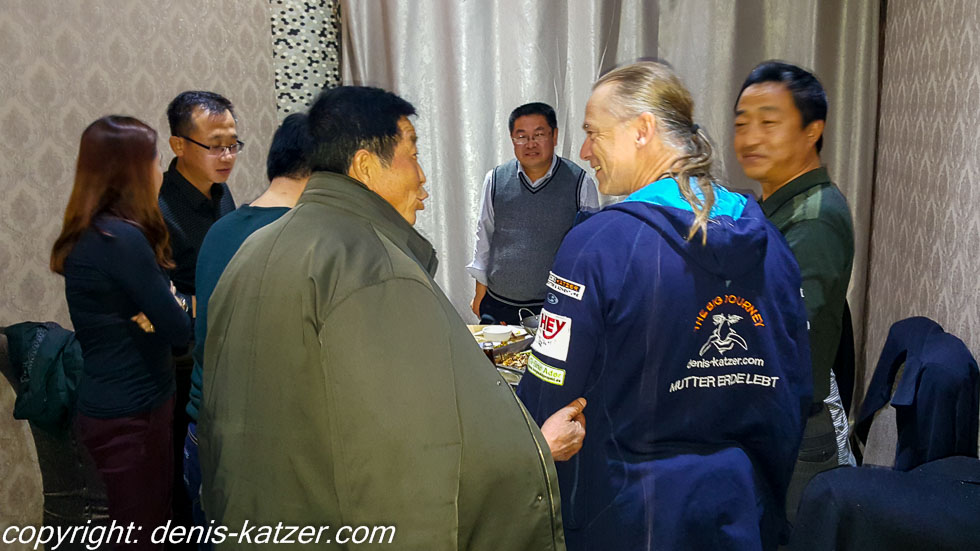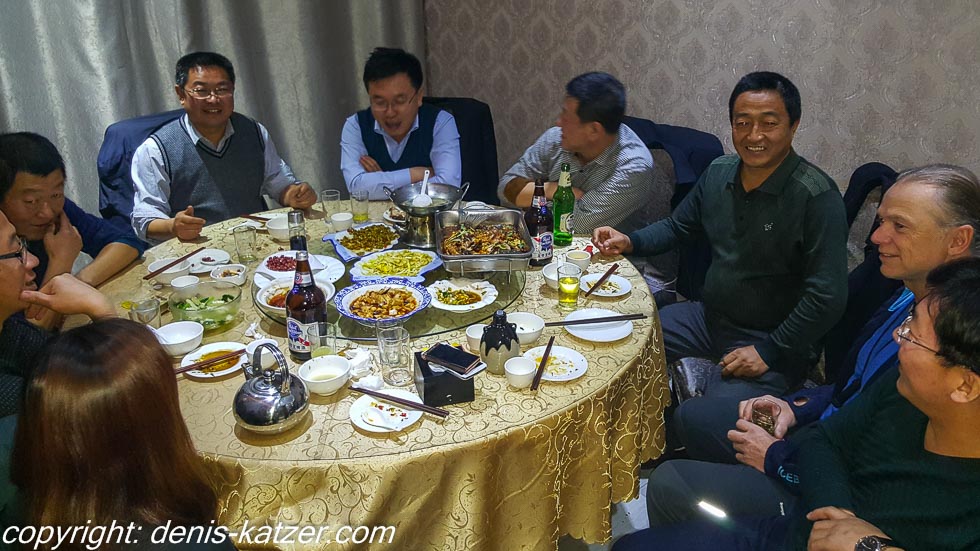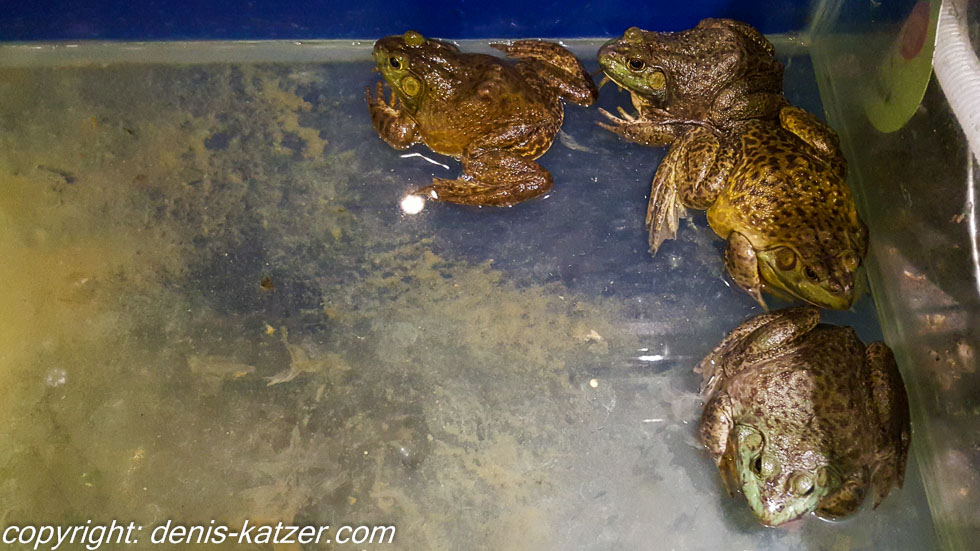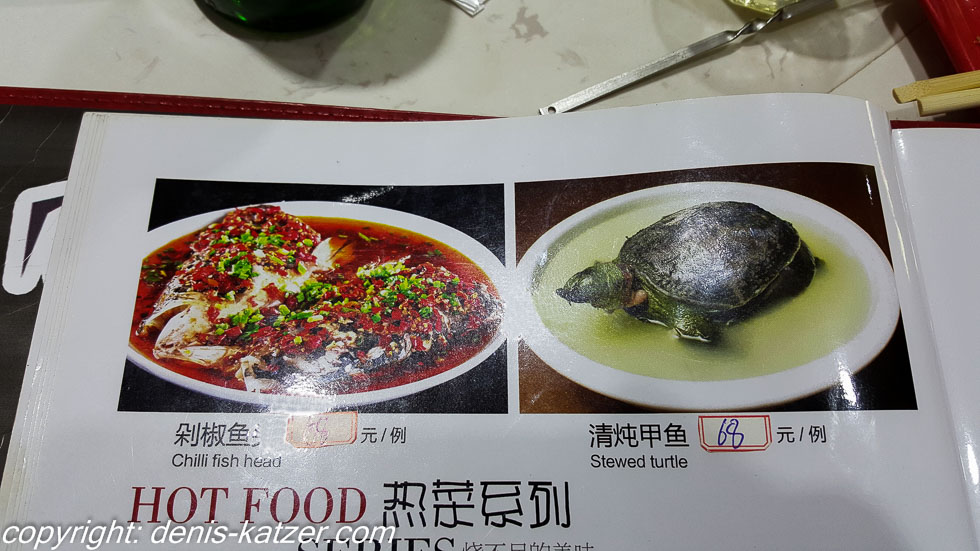
Do you like schnapps?
N 39°31'48.9'' E 112°48'06.4''
Date:
31.10.2015 to 02.11.2015
Day: 125 – 127
Country:
China
Province:
Shanxi
Location:
Shanyin
Latitude N:
39°31’48.9”
Longitude E:
112°48’06.4”
Total kilometers:
10,228 km
Maximum height:
1.500 m
Total altitude meters:
6.011 m
Sunrise:
06:54 h to 06:56 h
Sunset:
5:30 pm to 5:28 pm
Temperature day max:
6 to 9 °C
Temperature day min:
minus 1°C
Total plate tires:
8
Plate front tire:
2
Flat rear tire:
5
Plate trailer tire:
1
(Photos of the diary entry can be found at the end of the text).
In the evening, we are back in the cold and uncomfortable hotel restaurant. “Are you hungry?” asks Tanja. “Shouldn’t have eaten that box of cookies this afternoon,” I reply. “Then we’ll just order a snack,” she says as a Chinese man approaches our table and awkwardly tries to make small talk with us. “Did you understand what he wants from us?” asks Tanja. “I have no idea. I think he wants to invite us to dinner.” “Do you really think so?” “I think so.” “We can’t just let him invite us, can we?” “I suppose we don’t have a choice. If we refuse, it might be rude. Apart from that, we might get some specialties like the poor turtle pictured on the menu, or the poor fat toads in the terrarium or chicken legs, sheep, goat, pig or other creature offal.” “Just stop it again. So what are we going to do?” “We show him in our phrase book that we don’t tolerate glutamate and are vegetarians.” “I’m kind of uncomfortable expressing our wishes.” “You have a choice.” “Okay, okay, I don’t like turtles that have been thrown alive in their shells into boiling water,” says Tanja and shows the man, who is still standing patiently next to us, that we don’t eat meat. “Hen hao”, (very good) he says, takes the menu, calls the waitress and talks to her for quite a while. ‘What a shame, I’m not hungry today,’ I whisper. “If you don’t make it, Ajaci will be very happy,” Tanja replies. Suddenly the friendly Chinese man disappears into the separee next door. “Has he ordered something for us now?” wonders Tanja. “Let’s wait and see,” I say as a dish is served a few minutes later. I am delighted that our patron has only ordered one meal, as the waitress juggles two more dishes onto the table. “Phew, who’s going to eat all that?” I ask myself. We unpack our chopsticks, with which I’m now even able to safely maneuver individual peanuts into my mouth, as the strong arms of our waitress carry a heavy pot of steaming soup towards us. It seems to me that the Chinese not only build twelve-lane roads in deserted areas, but also serve up food for a whole team, knowing full well that there are only two little people sitting here. Another plate of roasted peanuts finds its way to our table. “We absolutely have to stop this,” I say, now visibly getting nervous. “How are you going to stop this?” “I don’t know, but it can’t go on like this.” Fortunately, the flood of food seems to have come to an end. “I think you should thank our neighbors with a few bottles of beer,” Tanja suggests. “Do you think so?” I ask a little reluctantly, because I’m tired and don’t feel like strenuous communication, especially in Chinese. “I really think so,” Tanja tells me. Minutes later, I pull myself together to greet the Chinese people in the separee next to us with a friendly “Ni hao” (good afternoon). “Ni hao! Ni hao!” they shout enthusiastically, jumping up from their chairs and welcoming me as if I were the long-awaited guest of honor. Voices and questions come at me from all sides. I try to answer with my best Chinese, which is not understood here either, sign language and everything I have in me. “She’s the Laoban”, (boss) “Like the boss?”, I try to ask and find out that the only Chinese woman at the table is the owner of the hotel where we are staying and the man who invited us is her boyfriend.
“Do you like schnapps? Come and have a toast with me.” “Uh, not really. All right, just a small one.” “Gambei” (cheers), my counterpart asks me to clink glasses with him. “Gambei” (cheers), I reply. “Oh, he speaks Chinese. He can say Gambei,” they chatter enthusiastically. Suddenly everyone just wants to have a sip with me and hear the “Gambei” from my mouth. Tanja, meanwhile, has the idea of putting the dishes we have been served on the table for the company. Her gesture is rewarded with loud cheers. “And you cycled from Germany to China?” we understand. “Shide”, (yes) I reply nodding and hand over my Chinese business card for the sake of good manners. “Katdsör”, the man reads haltingly and immediately pulls out his smartphone. “What did he mean,” asks Tanja. I think he’s read Katzer,” I suspect. Suddenly he cheers loudly, hands me his smartphone, on whose small display Tanja and I can be seen with the loaded bikes. “How is that possible?” I ask. “Do you remember the journalists who interviewed us on the street a few weeks ago? This is a Chinese article about us,” Tanja is convinced. After this realization, there is no stopping. Now we are stars, at least at this table. “Gambei! Gambei! Gambei!”, it sounds incessantly. “Gambei,” I reply with the best upright laugh I still have. Secretly, however, I curse Tanja’s well-intentioned idea to have sat me at this table. “Qing zhaopian”, (please take a photo) we understand. Everyone now wants to be photographed individually and in groups with us. It takes a while until all eight people present have saved all the possible photo constellations in their smartphones. As soon as the extensive session is over, it’s “Chi, chi, chi.” (Eat, eat, eat) The table is full to bursting with dishes of all kinds. Apparently it’s good manners to always leave plenty left over. Whenever we go to a restaurant, which is every day, we see Chinese people ordering far too much. In the end, most of them have the rest packed in plastic bags to take away. “Gambei Denis!” my counterpart calls out to me again. “I can’t take any more,” I try to refuse.
Then the company suddenly disintegrates. Chinese people don’t usually stay seated for a social gathering. When they have finished their meal, they pay and leave. “Please come with us,” the hotel manager and her partner ask us. We actually thought we could go to our room now, but it seems we were mistaken. “We still have to pay for our beer,” says Tanja and asks me to wait. “So, did we really have to settle another bill?” I ask the boss and her boyfriend minutes later, following them into their private apartment. “100 yuan.” (€14.47) “100 yuan? Were the beers that expensive?” “No, but our host invited us for one dish and not for all the dishes he had ordered.”
In the apartment, we are led through a sparse reception room that has the sobriety of a Chinese restaurant. The light is switched on in a small room. “Here is our meditation room,” says the boss, pointing to the golden Buddha statues. “Hen hao”, (very beautiful) we reply, not really knowing why we have been brought here. The owners of the large house hand us a few sticks of incense, which we place in one of the offering bowls in front of the figures, as custom demands. Then we stand there and ask ourselves what happens next. “I’m very tired,” says Tanja and politely asks to say goodbye. “Shide”, (yes) the hosts reply and wish us a nice evening with the words: “Wanshang hao”…
The live coverage is supported by the companies Gesat GmbH: www.gesat.com and roda computer GmbH www.roda-computer.com The satellite telephone Explorer 300 from Gesat and the rugged notebook Pegasus RP9 from Roda are the pillars of the transmission.
